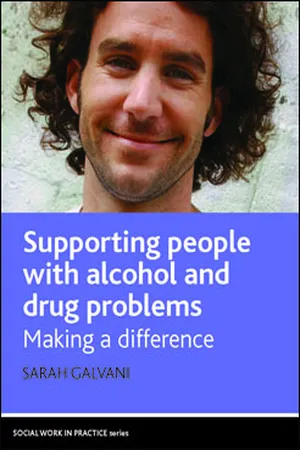![]()
References
Adams, P. (1999) ‘Towards a family support approach with drug-using parents: the importance of social worker attitudes and knowledge’, Child Abuse Review, 8, 15–28.
Adfam (2008) We count too. Good practice guide and quality standards for work with family members affected by someone else’s drug use. 2nd edn. Available online at: www.adfam.org.uk/publications/publications_for_professionals_and_practitioners/we_count_too [accessed 17 August 2011].
ADSS (Association of Directors of Social Services) (2005) Safeguarding adults: A national framework of standards for good practice and outcomes in adult protection work. London: ADSS.
Afuwape, S.A., Johnson, S., Craig, T.J.K., Miles, H., Leese, M., Mohan, R. and Thornicroft, G. (2006) ‘Ethnic differences among a community cohort of individuals with dual diagnosis in South London’, Journal of Mental Health, 15 (5), 551–67.
Agic, B., Mann, R.E. and Kobus-Matthews, M. (2011) ‘Alcohol use in seven ethnic communities in Ontario: a qualitative investigation’, Drugs: Education, Prevention and Policy, 18, (2), 116–23.
Alcohol Concern (2011) ‘Young people and alcohol’. Acquire factsheet. Available online at: www.alcoholconcern.org.uk [accessed 16 August 2011].
Alexander, T., DiNitto, D. and Tidblom, I. (2005) ‘Screening for alcohol and other drug use problems among the deaf’, Alcoholism Treatment Quarterly, 23 (1), 63–78.
Amaro, H., Dai, J., Arvalo, S., Acevedo, A., Matsumoto, A., Nieves, R. and Prado, G. (2007) ‘Effects of integrated trauma treatment on outcomes in a racially/ethnically diverse sample of women in urban community-based substance abuse treatment’, Journal of Urban Health, 84 (4), 508–22.
Anderson, T.L. and Levy, J.A. (2003) ‘Marginality among older injectors in today’s illicit drug culture: assessing the impact of ageing’, Addiction, 98, 761–70.
APA (American Psychiatric Association) (2000) Diagnostic and statistical manual of mental disorders. 4th edn, text revised. Washington, DC: American Psychiatric Association.
Appleby, L. (2004) The National Service Framework for Mental Health – five years on. London: DH.
Austin, A. and Wagner, E.F. (2010) ‘Treatment attrition among racial and ethnic minority youth’, Journal of Social Work Practice in the Addictions, 10 (1), 63–80.
Azrin, N.H. (1976) ‘Improvements in the community-reinforcement approach to alcoholism’, Behavioural Research and Therapy, 14 (3), 339–48.
Babor, T.F., de la Fuente, J.R., Saunders, J. and Grant. M. (1992) AUDIT. The Alcohol Use Disorders Identification Test: Guidelines for use in primary health care. Geneva: World Health Organization.
Baird, J., Longabaugh, R., Lee, C.S., Nirenberg, T.D., Woolard, R., Mello, M.J., Becker, B., Carty, K., Minugh, P.A., Stein, L., Clifford, P.R. and Gogineni, A. (2007) ‘Treatment completion in a brief motivational intervention in the emergency department: the effect of multiple interventions and therapists’ behavior’, Alcoholism: Clinical and Experimental Research, 31(Supplement 10), 71S–75S.
Banerjee, S., Clancy, C. and Crome, I. (2002) Co-existing problems of mental disorder and substance misuse (dual diagnosis). An information manual. Available online at: www.rcpsych.ac.uk/cru [accessed June 2010].
Barnard, M. (2005) Drugs in the family. The impact on parents and siblings. Final report. York: Joseph Rowntree Foundation.
Barnard, M. (2007) Drug addiction and families. London: Jessica Kingsley.
Barnett, O.W. and Fagan, R.W. (1993) ‘Alcohol use in male spouse abusers and their female partners’, Journal of Family Violence, 8, 1–25.
Bartels, S.J., Blow, F.C., Van Citters, A.D. and Brockmann, L.M. (2006) ‘Dual diagnosis among older adults co-occurring substance abuse and psychiatric illness’, Journal of Dual Diagnosis, 2 (3), 9–30.
Barter, C. (2009) ‘In the name of love: exploitation and violence in teenage dating relationships’, British Journal of Social Work, 39, 211–33.
Bashford, J. (2003) Resources for use in drug education and prevention work with Black and minority ethnic community groups. Report for DrugScope DEPIS. Final Draft. The Centre for Ethnicity and Health, University of Central Lancashire. Available online at: www.drugscope.org.uk/Resources/Drugscope/Documents/PDF/Good%20Practice/bashford.pdf [accessed 11 July 2011].
Bashford, J., Carpentier, C., Fountain, J., Khurana, J., Patel, K., Underwood, S. and Winters, M. (2004a) ‘Drug use amongst black and minority ethnic communities in the European Union and Norway’, Probation Journal, 51 (4), 362–78.
Bashford, J., Carpentier, C., Fountain, J., Khurana, J., Patel, K., Underwood, S. and Winters, M. (2004b) ‘Laying the foundations of an evidence base on drug use amongst black and minority ethnic communities: the research methods used for an EMCDDA project’, Journal of Ethnicity in Substance Abuse, 3 (1), 29–46.
BASW (2002) ‘Code of Ethics for Social Work’. Available online at: www.basw.co.uk [accessed 8 August 2011].
BASW Special Interest Group in Alcohol and other Drugs (2009) Position statement on alcohol and other drug problems. Available online at: www.basw.co.uk/special-interest-groups/alcohol-and-other-drugs/.
BASW Special Interest Group in Alcohol and other Drugs (2010) Position statement: Educating and enabling social workers to address alcohol and drug problems. Available online at: www.basw.co.uk/special-interest-groups/alcohol-and-other-drugs/.
Bear, Z., Griffiths, R. and Pearson, B. (2000) Childhood sexual abuse and substance use. London: The Centre for Research on Drugs and Health Behaviour.
Becker, J. and Duffy, C. (2002) Women drug users and drugs service provision: Service-level responses to engagement and retention. Report for the Home Office Drugs Strategy Directorate. DPAS paper 17. London: Home Office.
Beddoes, D., Sheikh, S., Khanna, M. and Francis, R. (2010) The impact of drugs on different minority groups: A review of the UK literature. Part 3: Disabled people. Available online at: www.ukdpc.org.uk/resources/disabled_people.pdf [accessed 21 June 2011].
Bender, K., Springer, D.W. and Kim, J.S. (2006) ‘Treatment effectiveness with dually diagnosed adolescents: a systematic review’, Brief Treatment and Crisis Intervention, 6 (3), 177–205.
Bennett, L. and O’Brien, P. (2007) ‘E...
